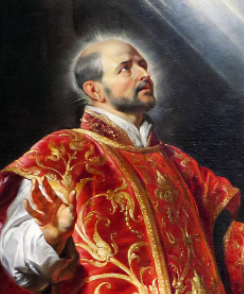Ignatius of Loyola Quotes

One ought to look much what is helpful to him,in order to admit it, and what does him harm, in order to discard it.
Ignatius of Loyola
(Spiritual Exercises, 1548)
IT HELPS TO CONTEMPLATE THE LIFE OF THE KING ETERNAL
Let him who is in consolation think how he will be in the desolation which will come after, taking new strength for then.
In every good election, as far as depends on us, the eye of our intention ought to be simple, only looking at what we are created for, namely, the praise of God our Lord and the salvation of our soul.
It belongs to God our Lord to give consolation to the soul without preceding cause, for it is the property of the Creator to enter, go out and cause movements in the soul, bringing it all into love of His Divine Majesty.
Let him who is in desolation consider how the Lord has left him in trial in his natural powers, in order to resist the different agitations and temptations of the enemy; since he can with the Divine help, which always remains to him, though he does not clearly perceive it: because the Lord has taken from him his great fervor, great love and intense grace, leaving him, however, grace enough for eternal salvation.
First, it is well to remark two things: the first is that love ought to be
put more in deeds than in words.
The second, love consists in interchange between the two parties; that is to
say in the lover’s giving and communicating to the beloved what he has or out of
what he has or can; and so, on the contrary, the beloved to the lover. So that if the
one has knowledge, he give to the one who has it not. The same of honors, of riches;
and so the one to the other.
We ought to note well the course of the thoughts, and if the beginning, middle and end is all good, inclined to all good, it is a sign of the good Angel; but if in the course of the thoughts which he brings it ends in something bad, of a distracting tendency, or less good than what the soul had previously proposed to do, or if it weakens it or disquiets or disturbs the soul, taking away its peace, tranquillity and quiet, which it had before, it is a clear sign that it proceeds from the evil spirit, enemy of our profit and eternal salvation.
The First Point is, to bring to memory the benefits received, of
Creation, Redemption and particular gifts, pondering with much feeling how much
God our Lord has done for me, and how much He has given me of what He has, and
then the same Lord desires to give me Himself as much as He can, according to His
Divine ordination.
And with this to reflect on myself, considering with much reason and justice,
what I ought on my side to offer and give to His Divine Majesty, that is to say,
everything that is mine, and myself with it, as one who makes an offering with
much feeling:
Take, Lord, and receive all my liberty, my memory, my intellect, and all my
will -- all that I have and possess. Thou gavest it to me: to Thee, Lord, I return it!
All is Thine, dispose of it according to all Thy will. Give me Thy love and grace, for
this is enough for me.
Third Rule. The third: OF SPIRITUAL CONSOLATION. I call it consolation when
some interior movement in the soul is caused, through which the soul comes to be
inflamed with love of its Creator and Lord; and when it can in consequence love no
created thing on the face of the earth in itself, but in the Creator of them all.
Likewise, when it sheds tears that move to love of its Lord, whether out of
sorrow for one’s sins, or for the Passion of Christ our Lord, or because of other
things directly connected with His service and praise.
Finally, I call consolation every increase of hope, faith and charity, and all
interior joy which calls and attracts to heavenly things and to the salvation of one’s
soul, quieting it and giving it peace in its Creator and Lord.
